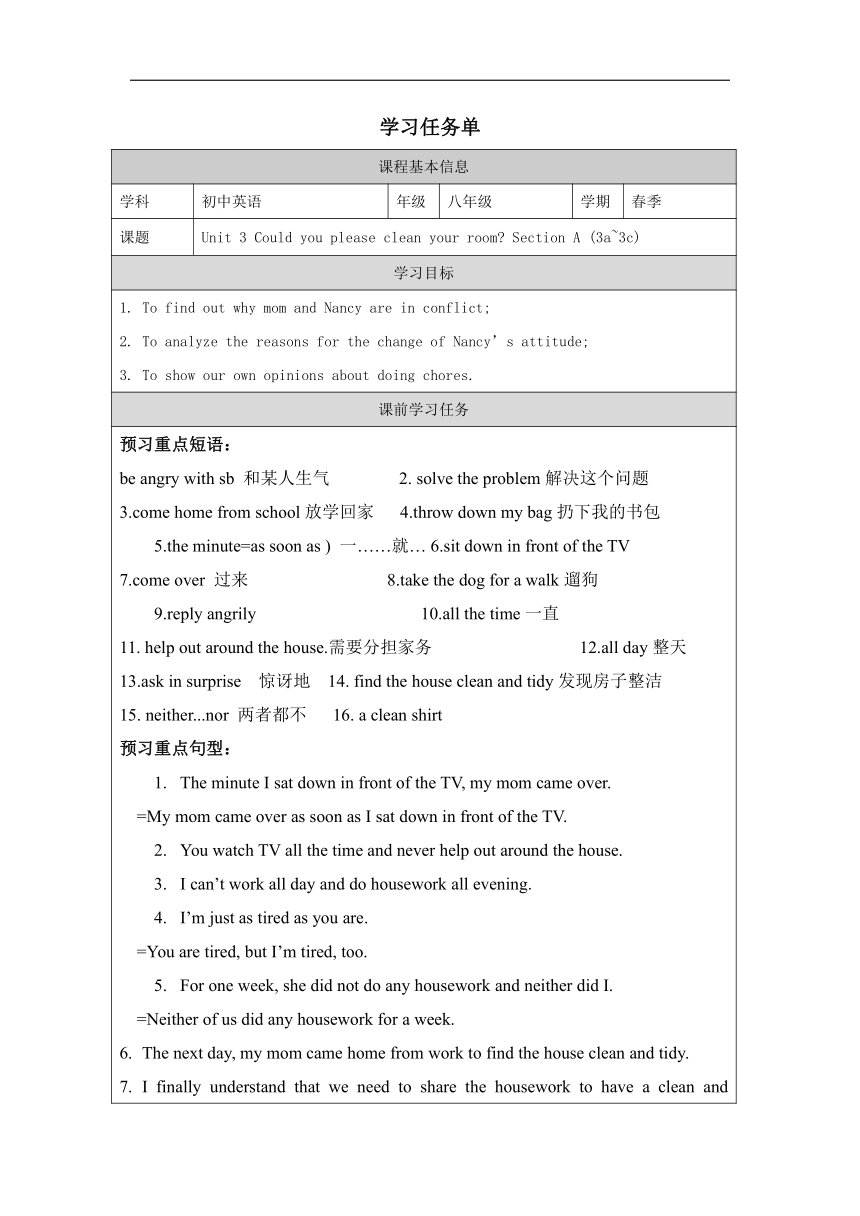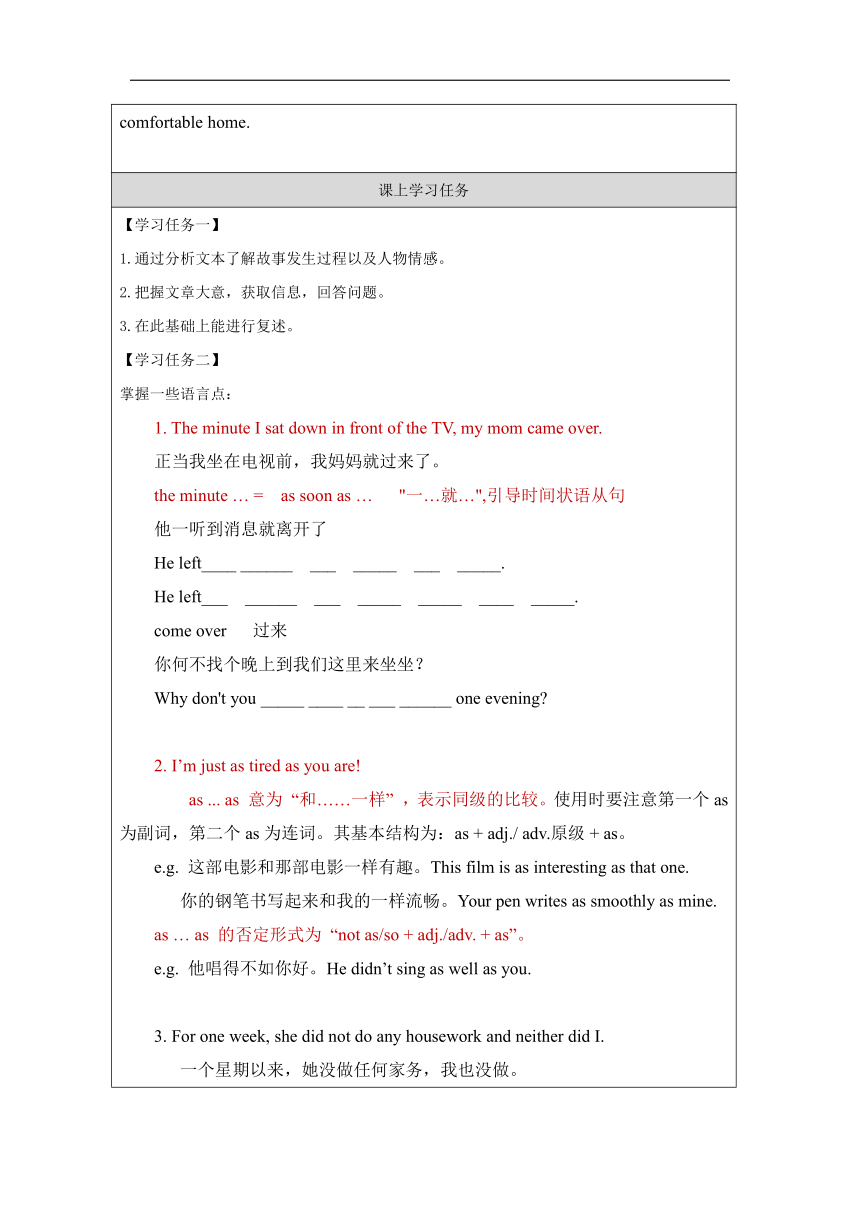Unit 3 Could you please clean your room Section A 3a—3c-学习任务单(表格式)人教版八年级下册
文档属性
| 名称 | Unit 3 Could you please clean your room Section A 3a—3c-学习任务单(表格式)人教版八年级下册 |

|
|
| 格式 | docx | ||
| 文件大小 | 23.8KB | ||
| 资源类型 | 教案 | ||
| 版本资源 | 人教新目标(Go for it)版 | ||
| 科目 | 英语 | ||
| 更新时间 | 2024-04-26 00:00:00 | ||
图片预览


文档简介
学习任务单
课程基本信息
学科 初中英语 年级 八年级 学期 春季
课题 Unit 3 Could you please clean your room Section A (3a~3c)
学习目标
1. To find out why mom and Nancy are in conflict; 2. To analyze the reasons for the change of Nancy’s attitude; 3. To show our own opinions about doing chores.
课前学习任务
预习重点短语: be angry with sb 和某人生气 2. solve the problem解决这个问题 3.come home from school放学回家 4.throw down my bag扔下我的书包 5.the minute=as soon as ) 一……就… 6.sit down in front of the TV 7.come over 过来 8.take the dog for a walk遛狗 9.reply angrily 10.all the time一直 11. help out around the house.需要分担家务 12.all day整天 13.ask in surprise 惊讶地 14. find the house clean and tidy发现房子整洁 15. neither...nor 两者都不 16. a clean shirt 预习重点句型: The minute I sat down in front of the TV, my mom came over. =My mom came over as soon as I sat down in front of the TV. You watch TV all the time and never help out around the house. I can’t work all day and do housework all evening. I’m just as tired as you are. =You are tired, but I’m tired, too. For one week, she did not do any housework and neither did I. =Neither of us did any housework for a week. The next day, my mom came home from work to find the house clean and tidy. I finally understand that we need to share the housework to have a clean and comfortable home.
课上学习任务
【学习任务一】
1.通过分析文本了解故事发生过程以及人物情感。 2.把握文章大意,获取信息,回答问题。 3.在此基础上能进行复述。
【学习任务二】 掌握一些语言点: 1. The minute I sat down in front of the TV, my mom came over. 正当我坐在电视前,我妈妈就过来了。 the minute … = as soon as … "一…就…",引导时间状语从句 他一听到消息就离开了 He left____ ______ ___ _____ ___ _____. He left___ ______ ___ _____ _____ ____ e over 过来 你何不找个晚上到我们这里来坐坐? Why don't you _____ ____ __ ___ ______ one evening 2. I’m just as tired as you are! as ... as 意为 “和……一样” ,表示同级的比较。使用时要注意第一个as为副词,第二个as为连词。其基本结构为:as + adj./ adv.原级 + as。 e.g. 这部电影和那部电影一样有趣。This film is as interesting as that one. 你的钢笔书写起来和我的一样流畅。Your pen writes as smoothly as mine. as … as 的否定形式为 “not as/so + adj./adv. + as”。 e.g. 他唱得不如你好。He didn’t sing as well as you. 3. For one week, she did not do any housework and neither did I. 一个星期以来,她没做任何家务,我也没做。 neither此处用作副词,意为“也不” neither + be动词/助动词/情态动词 +主语,意为“....也不”。这是一个倒装结构,表示上句否定的情况同样适用于后者。可用nor替换 例如:— I don’t like this dress. 我不喜欢这件连衣裙。 — ___________ __ _. 我也不喜欢。 例如:你不会说日语,我也不会。 You can't speak Japanese and ____ __ __ 托尼不喜欢做家务,汤姆也不喜欢 Tony doesn't like doing chores and____ ___ __ 拓展: Neither 作代词,意为“两者都不”,常与of 连用,后接带有冠词,物主代词等限定词的复数名词(或人称代词的宾格),作主语时,其谓语动词为单数。如: Neither of the flowers is beautiful. 两朵花都不漂亮。 Neither...nor...表示“既不...也不...”。 其含义是否定的,可连接任意两个并列的成分。如:她既不喜欢黄油也不喜欢奶酪。She likes neither butter nor cheese. 当neither...nor...连接两个主语时,谓语动词应遵循 “就近原则”。如: 今天父母都不在家。Neither Dad nor Mom is at home today. neither 还可作代词,表示“两者都不,双方均不”。做主语时谓语动词用单数 例如:他两封信都没回。He answered____ ___ ____ _____. 他们两个都不对____ ___ ____ ____ right. 【延伸】 “so+连系动词be/情态动词/助动词+主语”结构,表示上文的某种肯定情况也适用于下文。 e.g:They will play soccer tomorrow. So will we.他们明天去踢足球。我们也去踢。 “so+主语+连系动词be/情态动词/助动词”结构,表示对前面所说的情况加以肯定。e.g:She knows little English. So she does. 她英语懂得不多。的确如此。 【延伸】 either...or...意为“要么……要么……;或者……或者……”(连接并列主语,谓语动词遵循“就近一致”原则)。 both...and...意为“……和……;二者都……”(连接并列主语,谓语动词用复数)。 若将neither...nor...句型变为肯定句,只需把neither...nor...改为both...and...即可.如: Both Dad and Mom are at home today.今天父母都在家。 4. You watch TV all the time and never helped out around the house. 你总是看电视在家里从不帮忙 all the time(在该段时间内)一直;向来, 一向;时时刻刻;每时每刻 e.g. 我一直是这么做的。I do this all the time. 这种情况是时时发生的。 This happens all the time. 在help和out之间还可以加入具体的人,如: Can you help me out 你能帮我一把吗? They helped us out with the clean-up.他们帮助我们大扫除。 5. My mom came home from work to find the house clean and tidy.我妈妈下班回家发现房子既干净又整洁 to do 不定式作状语,表示结果,或没有预料到的事情和事与愿违的事情。 我醒来发现钱包丢了。I woke up to find my wallet lost. 他搜索了房间,没发现什么。He searched the room only to find nothing. 6. I threw down my bag and went to the living room. throw v. 扔;掷。 throw的过去式、过去分词分别为: threw和thrown。用作及物动词,throw sb. sth.=throw sth. to sb.扔给某人某物。 throw down 扔下;使倒下。与throw相关的其他短语:throw away 扔掉;丢弃 throw sth. at 向……扔某物(近)throw sth. to 投给……某物(远) (1) 她扔给我一条毛巾。 __________________________ (2) 他扔下书就出去了。 __________________________ (3) 他一头栽在床上就睡着了。__________________________ 7.be angry with sb.生某人的气 此短语相当于be mad at sb.。be angry about sth.对某事生气。
课程基本信息
学科 初中英语 年级 八年级 学期 春季
课题 Unit 3 Could you please clean your room Section A (3a~3c)
学习目标
1. To find out why mom and Nancy are in conflict; 2. To analyze the reasons for the change of Nancy’s attitude; 3. To show our own opinions about doing chores.
课前学习任务
预习重点短语: be angry with sb 和某人生气 2. solve the problem解决这个问题 3.come home from school放学回家 4.throw down my bag扔下我的书包 5.the minute=as soon as ) 一……就… 6.sit down in front of the TV 7.come over 过来 8.take the dog for a walk遛狗 9.reply angrily 10.all the time一直 11. help out around the house.需要分担家务 12.all day整天 13.ask in surprise 惊讶地 14. find the house clean and tidy发现房子整洁 15. neither...nor 两者都不 16. a clean shirt 预习重点句型: The minute I sat down in front of the TV, my mom came over. =My mom came over as soon as I sat down in front of the TV. You watch TV all the time and never help out around the house. I can’t work all day and do housework all evening. I’m just as tired as you are. =You are tired, but I’m tired, too. For one week, she did not do any housework and neither did I. =Neither of us did any housework for a week. The next day, my mom came home from work to find the house clean and tidy. I finally understand that we need to share the housework to have a clean and comfortable home.
课上学习任务
【学习任务一】
1.通过分析文本了解故事发生过程以及人物情感。 2.把握文章大意,获取信息,回答问题。 3.在此基础上能进行复述。
【学习任务二】 掌握一些语言点: 1. The minute I sat down in front of the TV, my mom came over. 正当我坐在电视前,我妈妈就过来了。 the minute … = as soon as … "一…就…",引导时间状语从句 他一听到消息就离开了 He left____ ______ ___ _____ ___ _____. He left___ ______ ___ _____ _____ ____ e over 过来 你何不找个晚上到我们这里来坐坐? Why don't you _____ ____ __ ___ ______ one evening 2. I’m just as tired as you are! as ... as 意为 “和……一样” ,表示同级的比较。使用时要注意第一个as为副词,第二个as为连词。其基本结构为:as + adj./ adv.原级 + as。 e.g. 这部电影和那部电影一样有趣。This film is as interesting as that one. 你的钢笔书写起来和我的一样流畅。Your pen writes as smoothly as mine. as … as 的否定形式为 “not as/so + adj./adv. + as”。 e.g. 他唱得不如你好。He didn’t sing as well as you. 3. For one week, she did not do any housework and neither did I. 一个星期以来,她没做任何家务,我也没做。 neither此处用作副词,意为“也不” neither + be动词/助动词/情态动词 +主语,意为“....也不”。这是一个倒装结构,表示上句否定的情况同样适用于后者。可用nor替换 例如:— I don’t like this dress. 我不喜欢这件连衣裙。 — ___________ __ _. 我也不喜欢。 例如:你不会说日语,我也不会。 You can't speak Japanese and ____ __ __ 托尼不喜欢做家务,汤姆也不喜欢 Tony doesn't like doing chores and____ ___ __ 拓展: Neither 作代词,意为“两者都不”,常与of 连用,后接带有冠词,物主代词等限定词的复数名词(或人称代词的宾格),作主语时,其谓语动词为单数。如: Neither of the flowers is beautiful. 两朵花都不漂亮。 Neither...nor...表示“既不...也不...”。 其含义是否定的,可连接任意两个并列的成分。如:她既不喜欢黄油也不喜欢奶酪。She likes neither butter nor cheese. 当neither...nor...连接两个主语时,谓语动词应遵循 “就近原则”。如: 今天父母都不在家。Neither Dad nor Mom is at home today. neither 还可作代词,表示“两者都不,双方均不”。做主语时谓语动词用单数 例如:他两封信都没回。He answered____ ___ ____ _____. 他们两个都不对____ ___ ____ ____ right. 【延伸】 “so+连系动词be/情态动词/助动词+主语”结构,表示上文的某种肯定情况也适用于下文。 e.g:They will play soccer tomorrow. So will we.他们明天去踢足球。我们也去踢。 “so+主语+连系动词be/情态动词/助动词”结构,表示对前面所说的情况加以肯定。e.g:She knows little English. So she does. 她英语懂得不多。的确如此。 【延伸】 either...or...意为“要么……要么……;或者……或者……”(连接并列主语,谓语动词遵循“就近一致”原则)。 both...and...意为“……和……;二者都……”(连接并列主语,谓语动词用复数)。 若将neither...nor...句型变为肯定句,只需把neither...nor...改为both...and...即可.如: Both Dad and Mom are at home today.今天父母都在家。 4. You watch TV all the time and never helped out around the house. 你总是看电视在家里从不帮忙 all the time(在该段时间内)一直;向来, 一向;时时刻刻;每时每刻 e.g. 我一直是这么做的。I do this all the time. 这种情况是时时发生的。 This happens all the time. 在help和out之间还可以加入具体的人,如: Can you help me out 你能帮我一把吗? They helped us out with the clean-up.他们帮助我们大扫除。 5. My mom came home from work to find the house clean and tidy.我妈妈下班回家发现房子既干净又整洁 to do 不定式作状语,表示结果,或没有预料到的事情和事与愿违的事情。 我醒来发现钱包丢了。I woke up to find my wallet lost. 他搜索了房间,没发现什么。He searched the room only to find nothing. 6. I threw down my bag and went to the living room. throw v. 扔;掷。 throw的过去式、过去分词分别为: threw和thrown。用作及物动词,throw sb. sth.=throw sth. to sb.扔给某人某物。 throw down 扔下;使倒下。与throw相关的其他短语:throw away 扔掉;丢弃 throw sth. at 向……扔某物(近)throw sth. to 投给……某物(远) (1) 她扔给我一条毛巾。 __________________________ (2) 他扔下书就出去了。 __________________________ (3) 他一头栽在床上就睡着了。__________________________ 7.be angry with sb.生某人的气 此短语相当于be mad at sb.。be angry about sth.对某事生气。
同课章节目录
- Unit 1 What's the matter?
- Section A
- Section B
- Unit 2 I'll help to clean up the city parks.
- Section A
- Section B
- Unit 3 Could you please clean your room?
- Section A
- Section B
- Unit 4 Why don't you talk to your parents?
- Section A
- Section B
- Unit 5 What were you doing when the rainstorm came
- Section A
- Section B
- Review of Units 1-5
- Unit 6 An old man tried to move the mountains.
- Section A
- Section B
- Unit 7 What's the highest mountain in the world?
- Section A
- Section B
- Unit 8 Have you read Treasure Island yet?
- Section A
- Section B
- Unit 9 Have you ever been to a museum?
- Section A
- Section B
- Unit 10 I've had this bike for three years.
- Section A
- Section B
